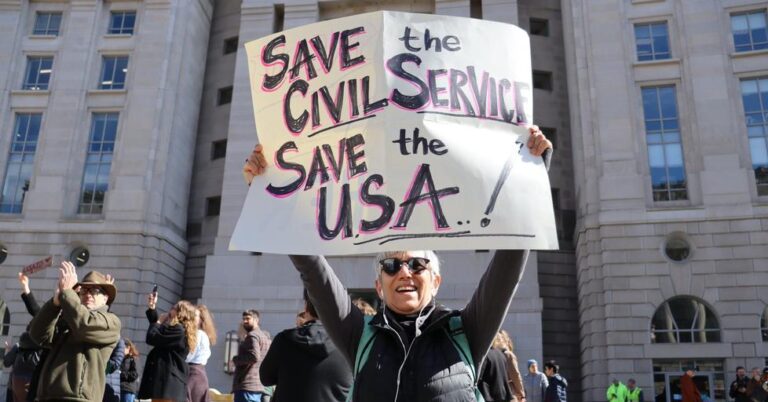Fifteen thousand steelworkers are gearing up to go on strike as workers campaign to reap some of the benefits of a recent resurgence in the steel industry supported by the Trump Administration’s steel tariffs. Steelworkers at plants owned by ArcelorMittal voted to go on strike earlier this week over ongoing contract negotiations — following a unanimous strike authorization by workers at U.S. Steel earlier this month. Together, ArcelorMittal and U.S. account for almost a quarter of U.S. steel production. Steel profits have surged in the last two years. But workers, who object to stagnant wages and rising healthcare costs, believe they’re not receiving their fair share of the benefits, pointing to multi-million dollar bonuses received by top ArcelorMittal executives even during weak years for the company. “There is a 90 percent chance” workers go on strike, a representative of the United Steelworkers told the Washington Post.
The National Labor Relations Board issued a secret new directive making it easier for dissatisfied workers to bring claims against unions, reports Bloomberg. The National Labor Relations Act, which the NLRB enforces, imposes a “duty of fair representation” on unions, which requires every union to represent all its workers in good faith and without any discrimination. Historically, the bar for a DFR complaint is high: the board accepts a “mere negligence” defense in cases where a union representative negligently fails to return phone calls to members or loses a worker’s grievance. Under the new directive, unions must have a “reasonable excuse or meaningful explanation” for a failure to respond. NLRB General Counsel Peter Robb argued that these cases rise to “gross negligence.” But former NLRB chairman William Gould said that the standard is a “stretch” beyond the Supreme Court’s case law on the duty of fair representation. Gould notes that the new directive could expose unions to far more litigation, especially when representatives aren’t full-time union officials.
Freelancers are raising the alarm about a predatory payment portal used by a growing number of media companies. WorkMarket, a payment portal used by companies like the Huffington Post and TechCrunch to manage freelancers, informs freelancers when their payments are available, often weeks after a piece is submitted. (After news of this surfaced yesterday, HuffPost announced it would no longer use the service). WorldMarket then provides freelancers the option to pay an eight percent fee to receive their payment — or to wait a few more weeks to get paid. Freelancers say the system is “absolutely predatory,” effectively forcing workers to take a pay cut to be paid on time. The system resembles Walmart’s PayActiv system that charges workers a fee to access their meager paychecks early.
A disturbing analysis by the Massachusetts Department of Public Health found that, from 2011 – 2015, construction and extraction workers in the state were six times as likely to die from opioids than the general population. Workers in the farmworking, forestry, and especially fishing industries were more than five times as likely as other workers to die from opioids. The MA Public Health Department noted that fatal opioid overdoses were significantly higher in industries with high rates of injuries on the job, with less access to paid sick leave, and with lower job security — possibly because these factors drive workers to use prescribed opioids to manage chronic and acute pain.
A working paper released by the National Partnership for Women & Families found that, if the wage gap were eliminated, a black woman working full time could afford two and a half years of childcare, three years worth of food for the family, or twenty-two months of rent.






Daily News & Commentary
Start your day with our roundup of the latest labor developments. See all
December 3
The Trump administration seeks to appeal a federal judge’s order that protects the CBAs of employees within the federal workforce; the U.S. Department of Labor launches an initiative to investigate violations of the H-1B visa program; and a union files a petition to form a bargaining unit for employees at the Met.
December 2
Fourth Circuit rejects broad reading of NLRA’s managerial exception; OPM cancels reduced tuition program for federal employees; Starbucks will pay $39 million for violating New York City’s Fair Workweek law; Mamdani and Sanders join striking baristas outside a Brooklyn Starbucks.
December 1
California farmworkers defend state labor law, cities consider requiring companies to hire delivery drivers, Supreme Court takes FAA last-mile drivers case.
November 30
In today’s news and commentary, the MSPB issues its first precedential ruling since regaining a quorum; Amazon workers lead strikes and demonstrations in multiple countries; and Starbucks workers expand their indefinite strike to additional locations. Last week, the Merit Systems Protection Board (MSPB) released its first precedential decision in eight months. The MSPB had been […]
November 28
Lawsuit against EEOC for failure to investigate disparate-impact claims dismissed; DHS to end TPS for Haiti; Appeal of Cemex decision in Ninth Circuit may soon resume
November 27
Amazon wins preliminary injunction against New York’s private sector bargaining law; ALJs resume decisions; and the CFPB intends to make unilateral changes without bargaining.